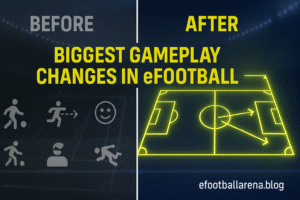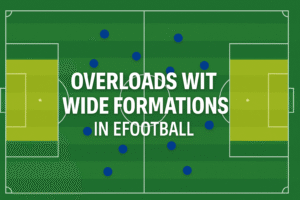For many aspiring esports players, the dream of competing in eFootball tournaments clashes with the realities of everyday life—school, college, or even full-time work. Unlike professional players who dedicate all their time to training, most players need to balance esports with study and work commitments.
The good news is, with the right time management strategies and structured routines, it’s possible to succeed in all three. This guide shows you how to balance study, work, and eFootball esports training without burning out.
1. Understand Your Priorities
Balancing three responsibilities requires clarity:
- Study/Work: These are long-term commitments that must remain a priority.
- Esports Training: Needs dedicated but manageable time slots.
- Health & Rest: Often overlooked, but essential for performance in all areas.
👉 First, recognize that esports is a passion that can complement, not replace, your main responsibilities.
2. Create a Structured Weekly Schedule
Time management is key.
- Study/Work Hours: Block fixed times for school or job duties.
- Training Sessions: Dedicate 1–2 hours daily for eFootball practice.
- Free Time & Rest: Avoid filling every gap—downtime prevents burnout.
Example Schedule
- Morning: Study/Work (school, office, or projects).
- Afternoon: Homework, revision, or work wrap-up.
- Evening: 1–2 hours of eFootball esports training.
- Weekend: Longer training sessions + tournaments.
3. Use Time Management Tools
Apps and tools help you stay consistent:
- Google Calendar: Syncs study, work, and gaming schedules.
- Pomodoro Technique: 25 min study/work → 5 min break → repeat.
- Habit Trackers: Keep track of daily training and progress.
👉 Esports pros often treat training like a job—discipline separates casual gamers from competitors.
4. Train Smarter, Not Just Longer
Many players make the mistake of grinding endlessly. Instead:
- Set Goals: Focus on specific skills (defending, passing, or set pieces).
- Replay Analysis: Watch replays to identify mistakes.
- Follow Pros: Study esports tournaments for strategies.
- Quality over Quantity: 1 hour of focused training > 3 hours of unfocused play.
5. Balance Study and Esports
For students balancing school/college and esports:
- Prioritize Exams & Deadlines: Never compromise academic milestones.
- Combine Learning & Gaming: Study breaks can double as short eFootball sessions.
- Reward System: Finish assignments → reward yourself with training time.
6. Balance Work and Esports
For players working jobs while pursuing esports:
- Use Evenings Effectively: Train after work in shorter, focused bursts.
- Leverage Weekends: Longer practice/tournament sessions.
- Communicate with Team: If playing in a squad, align training with your availability.
7. Take Care of Your Health
Esports, study, and work all demand mental energy.
- Sleep: Aim for 7–8 hours daily.
- Diet: Balanced meals for sustained focus.
- Exercise: Even 20 minutes of fitness helps stamina in tournaments.
- Breaks: Avoid long hours of sitting—stretch regularly.
👉 A healthy body supports sharper reflexes in esports and better concentration in study/work.
8. Manage Stress & Avoid Burnout
Signs of burnout: fatigue, lack of motivation, poor performance.
- Set Realistic Goals: Don’t aim to master everything at once.
- Take Breaks: Step away when frustrated.
- Stay Social: Balance esports with real-life connections.
9. Learn From Esports Pros
Many pro players started while balancing school or part-time work.
- They trained efficiently, not excessively.
- Built routines around academics first.
- Transitioned to full-time esports only when results justified it.
👉 Take inspiration but follow a schedule that fits your life.
10. Long-Term Perspective
Remember:
- Study and work create stability.
- Esports offers opportunities but requires balance.
- Even if esports doesn’t become a career, skills gained (discipline, focus, stress management) benefit study and work.
Conclusion
Balancing study, work, and eFootball esports training may seem overwhelming, but with the right structure and mindset, it’s absolutely possible. By prioritizing responsibilities, training smarter, managing your health, and avoiding burnout, you can grow in all areas without compromise.
Final Verdict: Success in esports isn’t just about gaming—it’s about balancing life responsibilities like a pro.
FAQs
Q1: How many hours should I train in eFootball while studying/working?
1–2 hours daily with longer weekend sessions is enough if training is focused.
Q2: Should I sacrifice sleep to train more?
No—lack of sleep reduces both study/work productivity and esports performance.
Q3: Can esports be a career if I’m studying or working?
Yes, but balance first—transition only if results and opportunities support it.
Q4: How do I stay consistent with limited time?
Use a fixed schedule and focus on quality training sessions.









